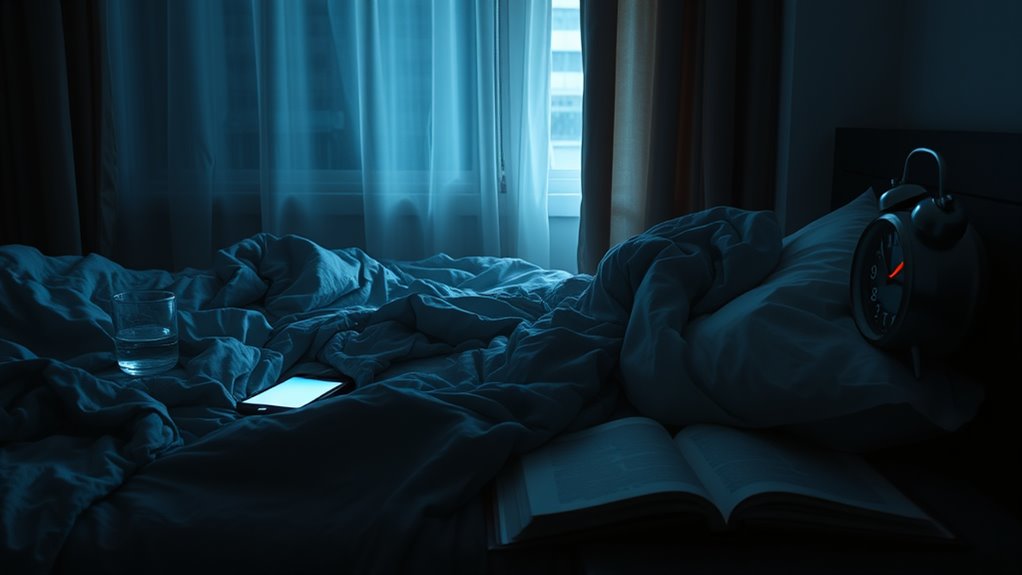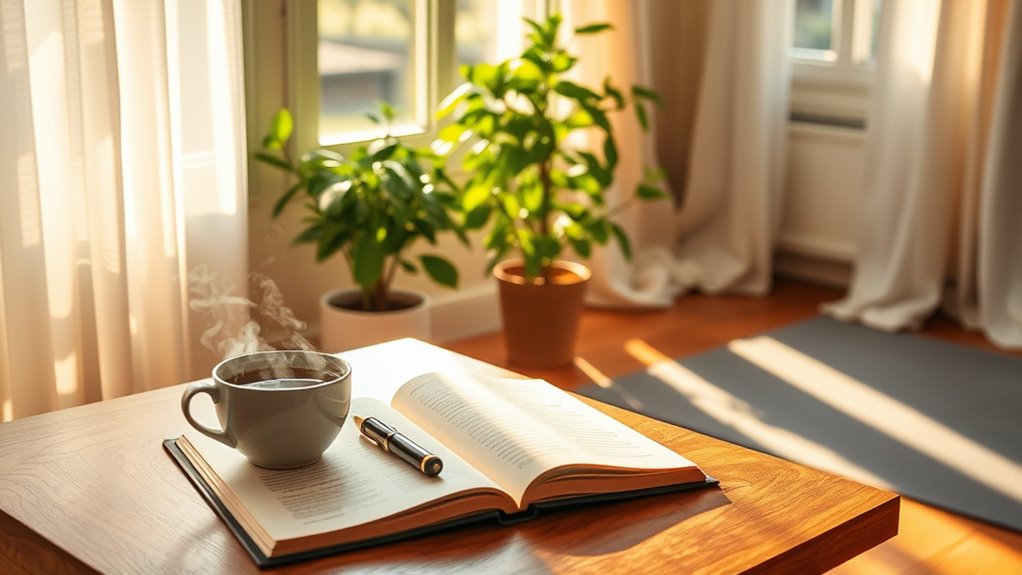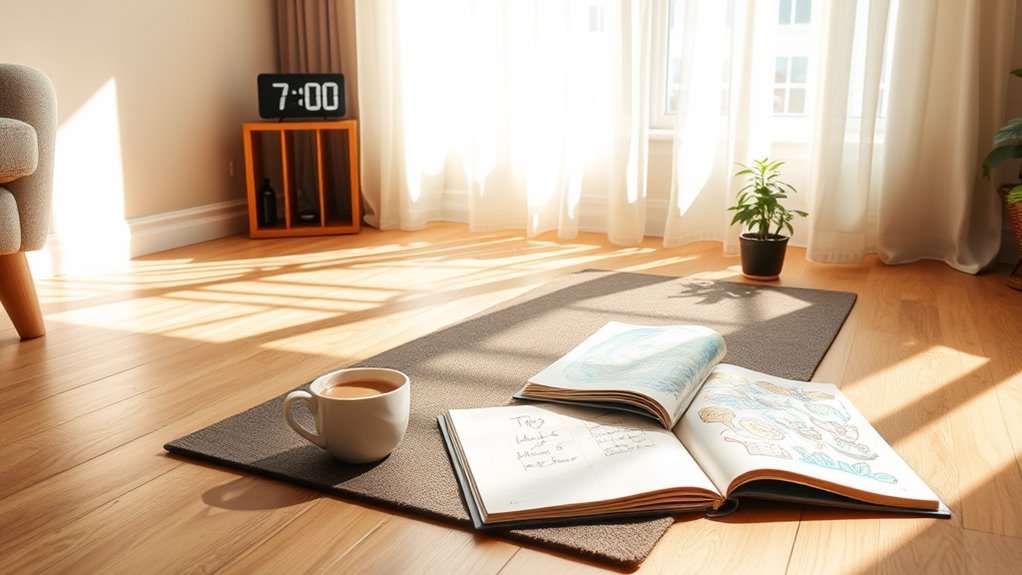Want Better Sleep. Here’s What You’re Doing Wrong
You might be sabotaging your sleep without realizing it. Ignoring sleep hygiene practices, consuming too much caffeine, and having an inconsistent sleep schedule can all disrupt your rest. If you’re glued to screens before bed, it’s affecting your melatonin production and sleep quality. Plus, a chaotic sleep environment and stress can make matters worse. There are simple adjustments you can make to improve your sleep—keep going to uncover effective solutions.
Key Takeaways
- Inconsistent sleep schedules disrupt your body’s natural rhythm, leading to poor sleep quality and difficulty concentrating.
- Excessive caffeine consumption, especially in the afternoon, can interfere with your ability to fall asleep and reduce sleep quality.
- Prolonged screen time before bed exposes you to blue light, which interferes with melatonin production and delays your sleep onset.
- A chaotic sleep environment with excessive light, noise, or uncomfortable bedding can significantly hinder your ability to unwind and fall asleep.
- Neglecting calming pre-sleep rituals and stress management techniques can leave you anxious, making it hard to relax before bedtime.
Ignoring Sleep Hygiene Practices
While you may not realize it, ignoring sleep hygiene practices can greatly affect your rest. Better sleep starts with establishing a consistent routine; aim for the same bedtime and wake-up time each day.
Create a calming pre-sleep environment by dimming lights and disconnecting from digital devices at least an hour before bed. Your bedroom should be cool, dark, and quiet—elements that promote relaxation. Incorporating simple nighttime rituals can further enhance your ability to unwind and prepare for sleep.
Pay attention to what you consume in the evening; light snacks are preferable, while heavy meals can disrupt your sleep. Incorporating these practices fosters an atmosphere conducive to better sleep, enhancing not just the number of hours but the quality of your rest.
Embrace these fundamentals, and you’ll wake up revitalized and ready to conquer the day.
Overconsumption of Caffeine and Stimulants
If you find yourself reaching for multiple cups of coffee or energy drinks throughout the day, it’s time to reconsider your caffeine intake.
These stimulants might boost your alertness in the short term, but overconsuming them can severely disrupt your sleep patterns. Caffeine has a long half-life, meaning its effects linger well after you’ve enjoyed that last cup. This interference with your body’s natural rhythms can lead to insomnia and decreased sleep quality, which ultimately hampers your performance.
In fact, prioritizing sleep is crucial for maintaining physical health and mental well-being, as it plays a vital role in self-care.
Instead of relying on caffeine, explore healthier alternatives like herbal teas or adaptogenic drinks that promote calmness.
By consciously managing your caffeine consumption, you’ll not only enhance your sleep but also improve your overall energy and daily focus.
Master your habits to master your sleep.
Inconsistent Sleep Schedule
An inconsistent sleep schedule can seriously impact your sleep quality, leaving you feeling groggy and unfocused. Sticking to a regular routine helps signal your body when it’s time to rest and wake up. Finding a rhythm can make a noticeable difference in how well you sleep each night. Additionally, establishing a consistent routine can help night owls transition into a more restful sleep pattern.
Impact on Sleep Quality
Inconsistent sleep schedules can wreak havoc on your sleep quality, leaving you feeling groggy and unfocused. When you vary your sleep times, your body’s internal clock gets disrupted, impairing your natural sleep-wake cycle.
This inconsistency can lead to fragmented sleep, preventing you from reaching deep, restorative stages. As a result, you might struggle with concentration, mood swings, and diminished performance during the day. You might also find it harder to fall asleep at night, creating a vicious cycle of sleep deprivation.
To master your sleep quality, aim for a regular schedule. Go to bed and wake up at the same time every day, even on weekends. This simple adjustment can profoundly enhance your alertness and overall well-being.
Importance of Routine
Establishing a consistent sleep routine is essential for improving your overall sleep quality. When you keep irregular hours, your body struggles to regulate its internal clock, making it harder to fall asleep and wake up refreshed.
Aim to go to bed and rise at the same times every day, even on weekends. This simple practice reinforces your circadian rhythm, enhancing alertness and focus during the day.
To master your sleep, incorporate calming pre-sleep rituals, like reading or meditation, that signal your body it’s time to wind down. Avoid stimulants and screens near bedtime, as they disrupt the routine you’re establishing.
Mastering this consistency not only improves your sleep but also optimizes your daily performance and well-being.
Excessive Screen Time Before Bed
While scrolling through your favorite social media feeds before bed might seem harmless, excessive screen time can seriously disrupt your sleep patterns.
The blue light emitted from screens interferes with melatonin production, the hormone responsible for regulating sleep. If you’re scrolling for hours, you’re not only delaying sleep but also reducing sleep quality. Your mind remains active, making it harder to unwind.
Instead of diving into your device, consider setting a screen curfew an hour before bedtime. Replace screen time with calming activities like reading or meditating. This shift can signal to your brain that it’s time to rest, helping you fall asleep faster and wake up feeling refreshed. Mindful practices like these can significantly improve your evening routine and enhance relaxation.
Prioritize reducing screen time to enhance your overall sleep quality.
Neglecting the Sleep Environment
Even if you’ve got a solid bedtime routine, neglecting your sleep environment can throw it all off. Your surroundings play a significant role in the quality of your sleep.
Here are four essential elements to take into account:
-
Light: Reduce exposure to bright lights with blackout curtains or sleep masks.
-
Noise: Minimize background noise using earplugs, white noise machines, or soothing music.
-
Temperature: Keep your room cool, ideally between 60-67°F (15-19°C), for ideal sleep.
-
Bedding: Invest in a comfortable mattress and pillows suited to your sleeping style.
Creating a conducive sleep environment is a fundamental aspect of ensuring better rest each night.
Stress and Anxiety Management Struggles
A restful environment sets the stage for better sleep, but stress and anxiety can still creep in, disrupting your nights. Managing these emotions is essential for achieving deep, restorative rest.
First, recognize the triggers behind your thoughts—your busy day, unresolved tasks, or personal concerns. Once you identify these, you can actively work to address them.
Consider adopting relaxation techniques, like mindfulness meditation or deep-breathing exercises, to calm your mind before bed. Writing down your worries in a journal can also help clear your head.
Establish a consistent wind-down routine, allowing your body to shift from the day’s chaos to a peaceful state. By mastering your stress management, you can reclaim your nights and promote better overall sleep quality.
Frequently Asked Questions
Can Certain Foods Affect Sleep Quality Negatively?
Yes, certain foods can negatively impact your sleep quality. Consuming caffeine, spicy dishes, or heavy meals too close to bedtime may disrupt your rest. You’ve got to be mindful of your dietary choices for better sleep.
How Does Exercise Influence Sleep Patterns?
Exercise markedly influences sleep patterns by promoting deeper, more restorative sleep. When you engage in regular physical activity, your body produces sleep-inducing hormones, helping you fall asleep faster and enjoy a more consistent sleep cycle.
What Are the Best Relaxation Techniques for Bedtime?
To enhance your bedtime routine, try deep breathing, progressive muscle relaxation, or guided imagery. These techniques calm your mind and body, setting the stage for restful sleep. Experiment to find what resonates best with you.
Are Sleep Supplements Effective for Better Sleep?
Sleep supplements can be effective, but their benefits vary by individual. You should evaluate your unique needs, consult a healthcare professional, and explore natural alternatives to find the best approach for enhancing your sleep quality.
How Does Age Impact Sleep Needs and Quality?
As you age, your sleep quality often diminishes. You may need less total sleep, but the deeper restorative stages become essential. Pay attention to changes in your patterns and adapt accordingly for ideal rest.





